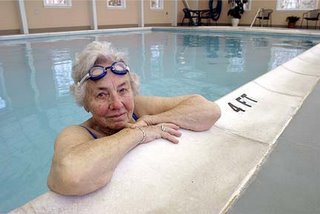In the Philippines, the mandatory retirement age is 60. Those who worked in the government are entitled to receive a pension—actually a measly amount not sufficient to provide anyone even below 60, basic goods and services in a month. Those who were in the private sector, which normally pays a higher amount of salary to its employees, are a bit luckier as their pensions may be a little more in tune with their basic needs.
 But what is a retiree actually expected to do? With Grandparents Day and Elderly Week just passed, there is increasing evidence that “old age” may actually be a state of mind.
But what is a retiree actually expected to do? With Grandparents Day and Elderly Week just passed, there is increasing evidence that “old age” may actually be a state of mind.Gone are the days when at 60, senior citizens actually looked and actually felt old. Their joints creaked with every movement, and their backs bent not only due to actual exhaustion but osteoporosis. These days, with 60 bruited to be the new 40 or 50, many retirees still want to work and lead very active lives.
One can only turn to elderly businessmen like John Gokongwei and Henry Sy now in their 70s and 80s, as models of “working retirees.” They may have already turned over the reins of their massive empires to their children, but they still remain active by helping plan or oversee some aspects of the businesses.
Dr. Yuwa Hedrick-Wong, a business strategist and economist, and author of the MasterCard publication The Glittering Silver Market: The Rise of the Elderly Consumers in Asia, makes the argument for a change in public policy to allow senior citizens to continue working.
“A multipronged approach is needed in terms of public policy in terms of pension. . .Plus make the system flexible so that the elderly are not penalized for wanting to work. Because in many countries now, as long as they continue to work, they’re not eligible for pension.
We should reward them beyond what age whatever that they deem appropriate to retire. They should be allowed to draw pension, and work and keep their income at the same time. Why not encourage them to contribute? But the way the system is set up, it penalizes the elderly who wants to work,” he said.
Asian countries have generally adopted the Western concept and policies on retirement. “But the irony is, as Asian countries are adopting the Western model, the west is changing. They are now prolonging and pushing the retirement age up, because they have to. They recognize they need the workers, they want to tap into their productivity,” said Yuwa.
He cited Northern Europe, specifically Finland, Sweden and Denmark—countries which face a rapidly aging population—as already finding ways to make their retirement policies flexible. In Finland, even if you work less than 25 hours a week, you can still draw on your full pension and keep your income.
In Canada, he said, 10 years ago, professors were mandated to retire by 65. Now the retirement age has been pushed back to 70, although many professors buck any mandatory retirement age.
Such a retirement model, if adopted in the Philippines, could spell the difference between just surviving and living full lives for many senior citizens, especially those who belong to the lower- and lower-middle income classes. Companies have to find a way to allow those dubbed as “knowledge workers” to keep their jobs, though not full-time. Although there are no official data on knowledge workers, they are typically professionals such as accountants and teachers, as opposed to manual laborers and industrial workers, or those who use their hands to make a living.
 But at what cost to local business? Actually, such a change in retirement policies would allow local companies that value the work of certain employees and staff, to keep them beyond retirement, albeit on a contractual basis. Business expenses need not increase because of this.
But at what cost to local business? Actually, such a change in retirement policies would allow local companies that value the work of certain employees and staff, to keep them beyond retirement, albeit on a contractual basis. Business expenses need not increase because of this.“You pay them by the hour. Most productive knowledge workers don’t want to work full-time anyway. They don’t want to work 9-5; they hate it. They want to tell you, ‘Next week I can fit you in for three hours. You pay me the three hours.’ For the company, that’s a tremendous opportunity. You need a very flexible system,” said Yuwa.
But he stressed that the need for a multi-pronged approach due to the large numbers of poor senior citizens. “Especially in emerging Asia [China, Malaysia, Indonesia, the Philippines], you’re going to have elderly poverty big time. Let’s not forget about [the] bottom third of the market. You have a lot of poor people depending on family support and so I think, public policy has to address the poverty, too—how to create effective support from a social welfare point of view.” (Ma. Stella F. Arnaldo, BusinessMirror Perspective, Oct. 10, 2006. Photos from www.greenmeadows.com)
No comments:
Post a Comment